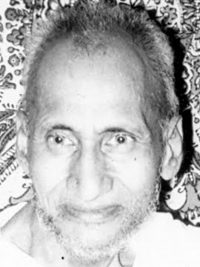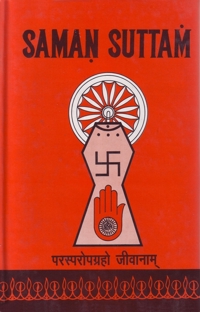24. Sramanadharma Sutra
(A) SAMATAPRECEPTS ON RELIGION OF MONKS
Equanimità
Samano tti samjado tti ya, risi muni sadhu tti vidarago tti.
Namani suvihidanam, anagara bhadamta damto tti. (336)Sramana, Samyata, Rsi, Muni, Sadhu, Vitaraga, Anagara, Bhadanta and Danta, these are designations used for monks with ideal behaviours. (336)
Siha-gaya-vasaha-miya-pasu, maruda-suruvahi-mamdarimdu-mani.
Khidi-uragamvarasarisa, parama-paya-vimaggaya sahu. (337)Monks who are in search of the supreme path of liberation, resembel a lion (in fearlessness), an elephant (in dignity), a bull (in strength), a deer (in uprightness), a beast (in freedom from attachment), the wind (in being companionless), the sun (in brilliance), an ocean (in serenity), the Mandara Mountain (in firmness) the moon (in coolness), a diamond (in lustre), the earth (in patience), a serpent (in being houseless) and the sky (in not being dependent). (337)
Bahave ime asahu, loe vuccamti sahuno.
Na lave asahum sahu tti, sahum sahu tti alave. (338)In this world, there are many ill-behaved monks who are called monks; a pseudo-monk should not be called a monk; but a true monk alone must be called a monk. (338)
Nanadamsanasampannam, samjame ya tave rayam.
Evamgunasamauttam, samjayam sahumalave. (339)A person who is endowed with (Right) knowledge and (Right) Faith, is engaged in self-restraint and penance, and is endowed truly with all these virtues, should be called a monk. (339)
Na vi mundiena samano, na omkarena bambhano.
Na muni rannavasenam, kusairena na tavaso. (340)A person does not become a monk by merely shaving his head, a Brahmin by repeating the Omkara mantra, a monk by residing in a forest, nor a hermit by wearing garments woven of darbha grass. (340)
Samayae samano hoi, bambhacerena bambhano.
Nanena ya muni hoi, tavena hoi tavaso. (341)A person becomes a Stramana by equanimity, a Brahmin by his celibacy, a Muni by his knowledge and an ascetic by his austerities. (341)
Gunehi sahu agunehisahu, ginhahi sahuguna mumcasahu.
Viyaniya appagamappaenam, jo ragadosehim samo sa pujjo. (342)A person becomes a monk by his virtues and a pseudo-monk by absence of virtues; therefore master all the virutes of a monk and be free from all the vices of a pseudo-monk; conquer your self through the self. He who possesses equanimity in the face of attachments and hatred is worthy of veneration. (342)
Dehadisu anuratta, visayasatta kasayasamjutta.
Appasahave sutta, te sahu sammaparicatta. (343)Those monks who are attached to their body, addicted to sensual pleasures, possessed of passions, and asleep in respect of their own nature are certainly devoid of righteousness. (343)
Bahum sunei kannehim, bahum acchihim pecchai.
Na ya dittham suyam savvam, bhikkhu akkhaumarihai. (344)A monk hears much through his ears and sees much with his eyes; but everything that he has seen and heard does not deserve to be narrated. (344)
Sajjhayajjhanajutta, rattim na suyamti te payamam tu.
Suttattham cimtamita, niddaya vasam na gacchamti. (345)The monks do not sleep long at night as they are engaged in studying of scriptures and meditation. They do not fall asleep as they are always reflecting on the meaning of precepts. (345)
Nimmamo nirahamkaro, nissamgo cattagaravo.
Samo ya savvabhuesu, tasesu thavaresu a. (346)The (real) monks are free from attachment, self-conceit, companionship and egotism, they treat impartially and equally all living beings, whether mobile or immobile. (346)
Labhalabhe suhe dukkhe, jivie marane taha.
Samo nindapasamsasu, taha manavamanao. (347)A real monk maintains his equanimity, in success and failure, happiness and misery, life and death, censure and praise and honour and disnhonour. (347)
Garavesu kasaesu, dandasallabhaesu ya.
Niyatto hasasogao, aniyano abandhano. (348)He is thoroughly unaffected by honour, passions, punishment, affliction and fear; he is undisturbed and unbound and free from laughter and sorrow.(348)
Anissio iham boe, paraloe anissio.
Vasicandanakappo ya, asane anasane taha. (349)He is neither interested in this world nor in the next. He is indifferent to food or fasts. He does not mind whether his limb is smeared with Sandal paste or cut off with an axe. (349)
Appasatthehim darehim, savvao pihiyasavo.
Ajjhappajjhanajogehim, pasatthadamasasane. (350)In this way, a monk prevents the influx of Karmas through inauspicious doors (i.e., ways) of every king and becomes engrossed in his rigorous self-contorl and discipline through his spiritual meditaion. (350)
Khuham pivasam dussejjam, siunham araim bhayam.
Ahiyase avvahio, dehe dukkham maha halam. (351)He must bear without any pang hunger, thirst, uncomfortable ground for sleep, cold, heat, uneasiness and fear. Morification of body is most fruitful. (351)
Aho niccam tavokammam, savvabuddhehim vanniyam.
Jaya lajjasama vitti, egabhattam ca bhoyanam. (352)Oh: all learned men have said that in order to observe penance constantly, it is necessary always to maintain self-restraint and to take food only once a day. (352)
Kim kahadi vanavaso, kayakaleso vicitta uvavaso.
Ajjhayanamonapahudi, samadarahiyassa samanassa. (353)What is the use of residing in a lonely place, mortification of body, different types of fasting, study of scriptures, keeping silence etc., to a monk who is devoid of equanimity? (353)
Buddhe parinivvude care, gama gae nagare va samjae.
Samtimaggam ca buhae, samayam Goyama! ma pamayae. (354)The enlightened and desisted monk should control himself; whether he be in a village or a town, and he should preach to all the road of peace; O.Gautama!, be careful all the while. (354)
Na hu jine ajja dissai, bahumae dissai magadesie.
Sampai neyaue pahe, samayam Goyama! ma pamayae. (355)In future people will say 'No Jinas are seen these days, while those proclaiming the path of spiritual progress hold divergent views; now being on the right path, O.Gautama! Be careful all the while?' (355)
(B) VESA-LINGA
External Appearance Or Distinguishing Marks
Veso vi appamano, asanjamapaesu vattamanassa.
Kim pariyattiyavesam, visam na marei khajjamtam. (356)Apparel is no proof of a person.s being self-controlled; for, does not a person without self-control wear the same dress? Does not poison kill a person who swallows it, even if he changes his dress? (356)
Paccayattham ca logassa, nanavihavigappanam.
Jattattham gahanattham ca, loge limgapaoyanam. (357)People wear various kinds of dresses to win the confidence of others. A distinguishing mark is useful to a person who is self-restrained to show the people that he is a monk. (357)
Pasandilimgani va, gihilimgani va bahuppayarani.
Ghittum vadamti mudha, limgaminam mokkhamaggo tti. (358)Fools put on various types of insignia of false ascetics or householders and maintain that this outer mark provides the path to liberation. (358)
Pulleva mutthi jaha se asare ayantie kudakahavane va.
Radhamani veruliyappagase, amahagghae hoi ya janaesu. (359)He, who is devoid of strength like a hollow fist, is untested like a false coin and a bead of glass shining like a diamond, will have no respect from the wise who know the truth. (359)
Bhavo hi padhamalimgam, na davvalimgam ca jana paramattham.
Bhavo karanabhudo, gunadosanam jina bimti. (360)Know that it is the mental state and not the dress that is the first distinguishing mark of spirituality. Jinas state that it is the mental state that is the cause of virtues and vices. (360)
Bhavavisuddhinimittam, bahiragamthassa kirae cao.
Bahiracao vihalo, abbhamtaragamthajuttassa. (361)Renunciation of external possessions is the cause of mental purity. Renunciation of external possessions is futile if it is not combined with internal resolve of non-attachment. (361)
Parinamammi asuddhe, gamthe mumcei bahire ya jai.
bahiragamthaccao, bhavavihunassa kim kunai? (362)If a monk who is of impure mentality renounces all external possessions, what can such renunciation do to one who is devoid of appropriate mental condition? (362)
Dehadisamgarahio, manakasaehim sayalaparicatto.
Appa appammi rao, sa bhavalimgi have sahu. (363)One, who is unattached to his body, is entirely free from passions like pride etc. and possessed of a soul which is engrossed in itself, is a real monk. (363)
 Jinendra Varni
Jinendra Varni

